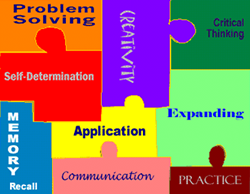Summative assessments measure how well the learning objectives are attained and make up a major part of a final grade.
Summative assessments can include quizzes, exams, papers, case studies, online debates, and group projects, to name a few. There are many summative assessments, most of which you already know and use. Therefore, this section will focus on authentic assessment methods and ways to improve online quizzing and exams.

Authentic Assessments:
The term “authentic assessment” commonly refers to assessments that measure not only what students have learned from course content, but also their ability to apply that knowledge in some kind of real-world situation. For example, students could demonstrate their mastery of content in a public health course by producing a white paper on the initial stages of an National Institute of Allergy and Infectious Diseases proposal.
A quiz or test may best measure students’ ability to perform lower-order cognitive skills such as remembering and understanding. Authentic assessments are better for appraising students’ ability to perform higher-order thinking skills such as applying, evaluating, and creating. They can also provide additional context and motivation or learning. In higher education, assessments that require complex thinking may also be called “performance assessments” because students are creating a performance (e.g. a paper, presentation, etc.) that demonstrates their learning.
 What is it:
What is it:
Students are asked to perform real-world tasks that demonstrate meaningful application of essential knowledge and skills.
Characteristics (construct knowledge):
-
Have real-world relevance
-
Are ill-defined
-
Comprise complex tasks to be investigated
-
Use a variety of resources to examine different perspectives
-
Provide opportunity to reflect, collaborate
-
Allow completed product, diverse outcomes
Grading and Feedback
Assessment needs to mean much more than giving students a grade score. It is also a way to provide valuable feedback to further learning.
Chris Dakes from the University of Wisconsin–Madison School of Business & College of Engineering provides a great tip for providing feedback on written assignments.
Why Feedback is Important
The reality is that, after each major assessment activity, each student wants to know from the instructor what they did well and what they did not do well. Providing a key of correct answers is good but does not explain to the student why their incorrect answers were incorrect. Individual written comments are necessary.
Granted, this can take a lot of time to complete. However, nothing is more central to educating students than focusing on the strengths and weaknesses of each student's work and giving them detailed explanations of what they did well and in what areas they need improvement.
Logically it might seem that giving them the correct answers would allow them to figure out where they went wrong, but to a student unfamiliar with a complex subject that may not be the case. Remember when you give feedback to make the most of your time and provide all-class feedback to common issues, take advantage of built-in learning management tools to provide comments, and provide feedback at times when this information can be used by the student to make progress in the course.
Optional Readings & Resources:
- Faculty Focus: 10 tips for more efficient and effective grading
- Penn State suggestions on grading
- Grading tips and strategies guide
- Authentic Assessment Toolbox: This site explains and provides a variety of resources for the creation and delivery of authentic assessments. It Includes forms of authentic assessment, sample rubrics, and guidelines for scoring and grading authentic assessments.
Featured Authentic Assessments
Problem-Based Learning
An instructional approach that empowers learners to conduct research, integrate theory and practice, and apply knowledge and skills to develop a viable solution to a defined problem.
Recommended Resource:
- The Motivation to Learn Begins with a Problem (resources from University of Delaware)
- Problem-Based Learning (resources from University of Florida)
Role Play
-
Activities where students simulate or respond to a scenario by assuming specific roles.
Recommended Resource:
- Role Play resources from University of Florida)
Case Studies
A case study us a scenario or problem written in the form of a story. The case method includes presentation of an issue relating to a real-world event, activity, or problem. Students are asked to research, debate, and/or solve a case problem or issue either individually or as a group.
Recommended Resources:
-
Brief explanation of case studies (also shared earlier in this module) from UNSW-Sydney
-
The mission of the National Center for Case Study Teaching in Science at the University at Buffalo is to promote the development and dissemination of materials and practices for case teaching in the sciences. This website provides access to an award-winning collection of peer-reviewed case studies in science and engineering.
- Creative Commons Case Studies includes a variety of case studies that are free to use.
- MERLOT, a peer-reviewed, free educational resources, has a number of free educational Case Studies. Search these case studies by clicking on advance search to find a topic or discipline.
- Harvard Case Studies were developed by the Harvard Graduate School of Education. Small fee required.
University of Wisconsin–Madison instructors discuss the value of authentic assessment:
- Evelyn Howell, Landscape Architecture, College of Letters & Science
- Doug Hadley, Landscape Architecture, College of Letters & Science
On the next page we will cover online quizzing and exams, which are often used for summative assessment.